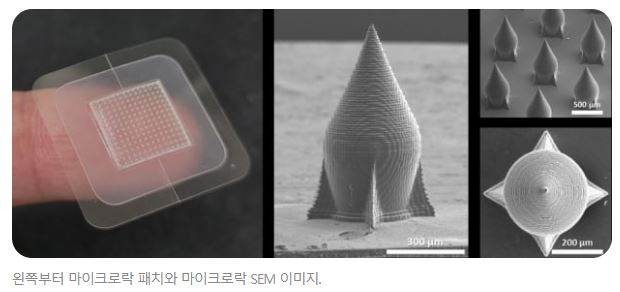Cursor's Bio Registers Advanced Materials for Microneedle Administrati…
Page info
Name admin Views 1,657 Datetime 23-06-09 14:262022. Dec. 23.
This is an article on Cursus Bio, Inc. SYP's investment and commercialization support.
Cursus Bio, a subsidiary of IQR, announced on the 22nd that the results of a study on the efficacy of microneedle (fine needle) administration of immuno-cancer drugs were published in the international academic journal Advanced Materials. It is explained that the results of the skin cancer animal model experiment showed excellent effects compared to subcutaneous injections. It has also completed applications for related additional patents.
The platform technology "Microlock" developed by Cursus Bio overcame the structural limitations of existing microneedles, enabling quantitative transmission of high-dose drugs.
Cursus Bio produced a mold that can be loaded with high-dose drugs and transmitted quantitatively. The iCure Wanju plant is building a mass production facility for cosmetics and pharmaceuticals microlock patches.
Most of the existing microneedles are produced in conical shapes, so they tend to break when attaching the skin or break off after attaching it. In addition, it is said that it is difficult to transmit the drug quantitatively because there is a drug in the support along with the acupuncture area (TIP) of the microneedle during the manufacturing process. Microlock said that high-content drugs can be mounted only on the TIP part, and quantitative transmission is possible by preventing detachment when attaching the skin.
In this study, 'SD-208', an inhibitor of PD-L1 antibodies and TGF-β involved in the growth of tumors, was applied to microlocks. The results of inhibiting tumor growth in melanoma animal models were confirmed. In addition, the combined administration of PD-L1 antibodies and SD-208 increased the number of tumor-infiltrating lymphocytes (TIL).
The company emphasized that this study proved the possibility of a next-generation chemotherapy method for micro-lock-based PD-L1 antibodies and SD-208 combined administration. Microlock is expected to be a new treatment strategy that improves excellent anticancer effects and patient compliance.
Cursus Bio said it is developing whitening and wrinkle-improving cosmetics and various biopharmaceuticals (vaccines, botulinum toxin, etc.) based on microlocks. First of all, it aims to enter the cosmetics market in the first half of next year.
Related Links
- https://www.hankyung.com/it/article/202212224466i 1273 connections
- https://www.press9.kr/news/articleView.html?idxno=53912 1706 connections

